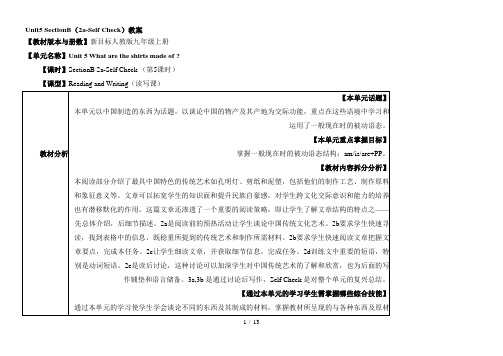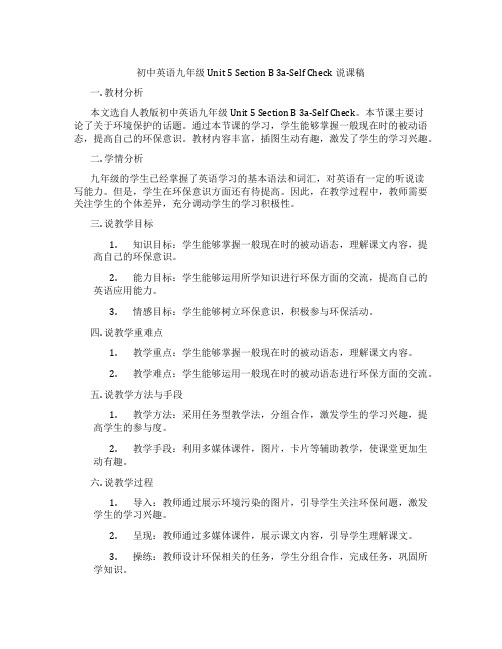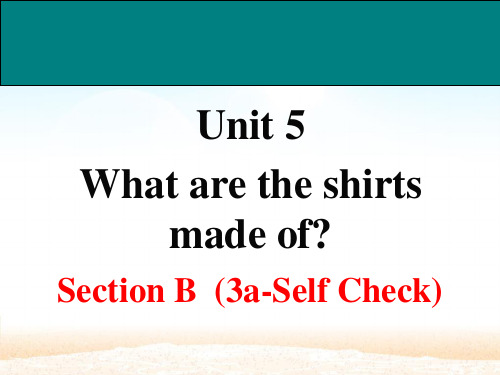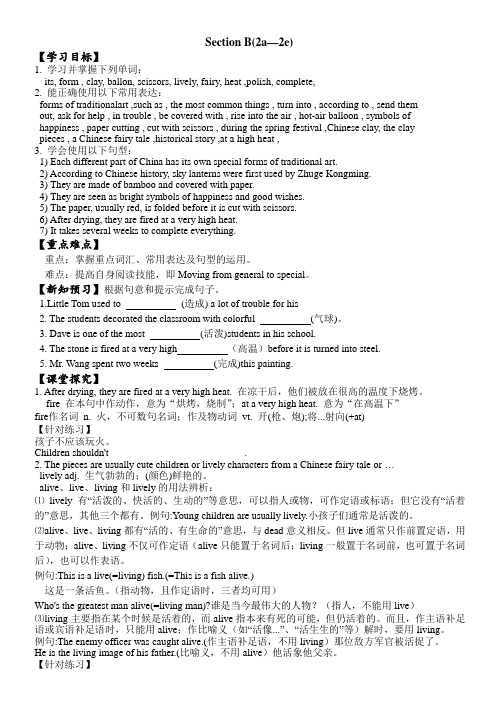人教版九年级UNIT5导学案selfcheck
人教版九上英语 Unit 5 Self Check(综合素养提升练)

The dragon dance 12 during the Han Dynasty and was started by the Chinese who had great respect for dragons. The dragon dance was already a popular 13 by Song Dynasty. At that time, people could often see 14 during important festivals. In the Qing Dynasty, the Dragon Dance Team of Fuzhou was invited to give a 15 in Beijing, which gave the emperor great satisfaction!
and abroad.
C.In the future,Chinese brands will continue to develop.
D.MFiollrioansloonfgthtiemUe,S “usmerasdsepeinndCahninaav”eramgeadoef p4e6opmleintuhtienskoonf
People , especially little kids , are interested in his skills. ▲ , he also stops by colleges.
Many college students have been drawn to the art, waiting in line for hands-on experience.Among them, Simon, a foreign student, couldn’t help having a try.Though it looked easy, he found it difficult to make it.Thanks to Xiong’s help, Simon finally saw a horse slowly taking shape.
人教版英语九年级全一册教案:Unit5SectionB(2a-SelfCheck)

Unit5 SectionB(2a-Self Check)教案
【教材版本与册数】新目标人教版九年级上册
【单元名称】Unit 5 What are the shirts made of ?
【课时】SectionB 2a-Self Check (第5课时)
【课型】Reading and Writing(读写课)
1 / 13
2 / 13
附:教学活动设计
4 / 13
6 / 13
7 / 13
8 / 13
9 / 13
10 / 13
2.Ask Ss to talk about 3a with their partners. And the following tips may help you .
1)What the product is
2)What it is made of/from
3)Who it is made by
4)Where it I made 阅读后与同学一起讨论自己家乡的
有名产品,做好笔记,由读到说,语
音输入到语音输出,为下一步写作作
准备。
读后说和写都是语言输出,学生能运
用所学知识写作创作自己的英语,学
以致用。
通过课后对自己家乡
的名产品的讨论,加
强对家乡的了解,检
测学生在课后是否能
基本运用本堂课的所
学内容,提炼表达自
己的观点,创作自己
的英语,学以致用,
体现对学生的可持续
性评价。
11 / 13
12 / 13
13 / 13。
初中英语九年级 Unit 5 Section B 3a-Self Check说课稿

初中英语九年级 Unit 5 Section B 3a-Self Check说课稿一. 教材分析本文选自人教版初中英语九年级Unit 5 Section B 3a-Self Check。
本节课主要讨论了关于环境保护的话题。
通过本节课的学习,学生能够掌握一般现在时的被动语态,提高自己的环保意识。
教材内容丰富,插图生动有趣,激发了学生的学习兴趣。
二. 学情分析九年级的学生已经掌握了英语学习的基本语法和词汇,对英语有一定的听说读写能力。
但是,学生在环保意识方面还有待提高。
因此,在教学过程中,教师需要关注学生的个体差异,充分调动学生的学习积极性。
三. 说教学目标1.知识目标:学生能够掌握一般现在时的被动语态,理解课文内容,提高自己的环保意识。
2.能力目标:学生能够运用所学知识进行环保方面的交流,提高自己的英语应用能力。
3.情感目标:学生能够树立环保意识,积极参与环保活动。
四. 说教学重难点1.教学重点:学生能够掌握一般现在时的被动语态,理解课文内容。
2.教学难点:学生能够运用一般现在时的被动语态进行环保方面的交流。
五. 说教学方法与手段1.教学方法:采用任务型教学法,分组合作,激发学生的学习兴趣,提高学生的参与度。
2.教学手段:利用多媒体课件,图片,卡片等辅助教学,使课堂更加生动有趣。
六. 说教学过程1.导入:教师通过展示环境污染的图片,引导学生关注环保问题,激发学生的学习兴趣。
2.呈现:教师通过多媒体课件,展示课文内容,引导学生理解课文。
3.操练:教师设计环保相关的任务,学生分组合作,完成任务,巩固所学知识。
4.输出:教师学生进行角色扮演,运用所学知识进行环保方面的交流。
5.总结:教师对本节课的内容进行总结,强调环保的重要性。
七. 说板书设计板书设计简洁明了,主要包括以下内容:1.课题:Unit 5 Section B 3a-Self Check2.教学重点:一般现在时的被动语态3.教学难点:运用一般现在时的被动语态进行环保方面的交流4.教学目标:知识目标,能力目标,情感目标八. 说教学评价教学评价主要包括以下方面:1.学生对课文内容的理解程度,通过课堂回答问题进行评价。
2019年秋人教版九年级上册英语教案:Unit5SectionB(3a-SelfCheck)

四、教学流程
(一)导入新课(用时5分钟)
同学们,今天我们将要学习的是Unit 5 Section B的3a-Self Check部分。在开始之前,我想先问大家一个问题:“If you had a million dollars, what would you do?”(如果有了一百万美元,你们会做什么?)这个问题与我们将要学习的内容密切相关。通过这个问题,我希望能够引起大家的兴趣和好奇心,让我们一同探索金钱、梦想和目标的奥秘。
(二)新课讲授(用时10分钟)
1.理论介绍:首先,我们要了解文章中提到的如何设定目标和实现梦想。目标是……(详细解释目标的含义和重要性)。
2.案例分析:接下来,我们来看文章中的案例。这个案例展示了作者如何设想用一百万美元实现自己的梦想,以及这个梦想背后的价值观。
3.重点难点解析:在讲授过程中,我会特别强调目标设定的重要性以及条件句型(If...)的使用。对于难点部分,我会通过例句和实际操作来帮助大家理解。
1.继续学习并掌握本单元的目标词汇和短语,如:achieve, goal, determine, confident, skill等。
2.阅读并理解文章《If I Had a Million Dollars》,探讨金钱对不同人的意义和影响。
3.分析文章中的语法结构,学习使用条件句型(If...)表达假设和愿望。
2.增强学生的语言表达能力:引导学生运用所学词汇和语法结构,表达个人观点和梦想,提高用英语进行有效沟通的能力。
3.培养学生的思维品质:通过小组讨论,激发学生的批判性和创造性思维,使其能够分析、评价不同的价值观和生活方式。
4.强化学生的文化意识:让学生了解并尊重不同文化背景下人们对金钱、目标和梦想的看法,培养跨文化交际意识。
人教版九年级英语上册Unit5 Section B 3a-Self Check四

addition, they look beautiful as they are decoroavteerd with beautiful patterns. Many people from all of the world
come to SuZhou to visit the silk factories and buy only too
What the product is the pancake
What it is made of / from Who it is made by Where it is made What it can do
flour
Zhuge Liang Shandong be eaten in different ways
silk plastic leather
gold resin
Fill in the blanks
My city SuZhou is _fa_m__o_u_s_ for its silk quilts. These quilts are made of pure _s_il_k_. They are made by _sk_i_ll_f_u_l workers in many silk factories in the city. The silk quilts are used to _k_e_ep_ people warm and comfortable in bed. They are _k__n_o_w_n_ to be very comfortable because they are light and soft to _to_u_c_h_. In addition, they look beautiful _a_s they are decorated with beautiful patterns. Many people from all over the world come to SuZhou to _v_i_si_t the silk factories and buy _n_o_t_o_n_l_ythe silk quilts _b_u__t many other silk products too.
人教版英语九年级全一册 Unit5 课时5 Section B 2a-Self Check 学案

Section B(2a—2e)【学习目标】1. 学习并掌握下列单词:its, form , clay, ballon, scissors, lively, fairy, heat ,polish, complete,2. 能正确使用以下常用表达:forms of traditionalart ,such as , the most common things , turn into , according to , send themout, ask for help , in trouble , be covered with , rise into the air , hot-air balloon , symbols of happiness , paper cutting , cut with scissors , during the spring festival ,Chinese clay, the claypieces , a Chinese fairy tale ,historical story ,at a high heat ,3. 学会使用以下句型:1) Each different part of China has its own special forms of traditional art.2) According to Chinese history, sky lanterns were first used by Zhuge Kongming.3) They are made of bamboo and covered with paper.4) They are seen as bright symbols of happiness and good wishes.5) The paper, usually red, is folded before it is cut with scissors.6) After drying, they are fired at a very high heat.7) It takes several weeks to complete everything.【重点难点】重点:掌握重点词汇、常用表达及句型的运用。
九年级英语全册Unit5WhataretheshirtsmadeofPeriod6SectionBa_SelfCheck)导学案人教新目标

Unit 5 What are the shirts made of【学习目标】1、熟记本节单词,达到灵活运用。
2、加强阅读指导,提升综合能力【预习•合作•探究】1. These usually try to show the things that are important in life, such as love, beautyand family.such as和for example都有“例如”的意思,但是它们的用法有所不同。
★such as常用来列举同类人或事物中的多个例子。
e.g. I like animals, such as dogs, bears and pandas.我喜欢动物,如狗、熊、熊猫。
★for example一般只以同类人或事物中的“一个”为例。
e.g. He has ever been to man y countries, for example, Australia.他曾经去过许多国家,如澳大利亚。
2. The most common things, from pap er to clay to bamboo, are turned into objects of beauty.1) turn…into…表示“把……变成……;使……变成……”,而turn into表示转变;变成”等意思。
e.g. Can you turn an egg into a flower?你能把鸡蛋变成花朵吗?The sunny morning turned into a rainy day.晴朗的早晨变成了雨天。
2) objects of beauty 在此为“精美植物;精美物品的意思。
其中object指具体、实际的“物品;东西”e.g. Look, the re’s a strange object in the sky!快瞧,天上有一个奇怪的东西。
3. According to Chinese history, sky lanterns were first used by Zhuge Kongming. according to 根据,按照,据……所说e.g. According to the radio, it will rain tomorrow.据电台广播,明天有雨。
人教版英语九年级全册Unit5SectionB(3a~SelfCheck)教学设计

4.通过角色扮演、讨论等互动活动,激发学生的学习兴趣,提高英语口语表达能力。
(三)情感态度与价值观
1.培养学生热爱科学、勇于探索的精神,认识到科技对人类生活的影响。
2.通过对本章节课文的学习,使学生了解伟人的成就及其背后的努力和付出,激发学生树立远大理想,培养积极进取的人生态度。
6.自我评估:学生在课后进行自我评估,总结自己在课堂上的表现,包括词汇掌握、语法运用、阅读理解和口语表达等方面,找出自己的优点和不足,为下一步学习制定目标。
作业布置要求:
1.学生需按时完成作业,保持书写规范,注意单词拼写和语法正确性。
2.家长协助监督,确保学生认真完成作业,养成良好的学习习惯。
3.教师将根据作业完成情况进行反馈,帮助学生提高英语水平。
3.能够通过阅读理解文章,获取、整理并传达文章的主旨大意和具体信息。
4.借助思维导图等学习工具,整理和复述课文内容,提高语言组织和表达能力。
(二)过程与方法
1.通过小组合作的方式,进行词汇学习和语法讨论,培养学生的合作意识和团队精神。
2.通过阅读策略的训练,如预测、扫描和略读,提高学生的阅读效率和理解能力。
为了巩固本章节的学习内容,确保学生能够熟练掌握一般过去时和现在完成时的用法,以及科技相关词汇的运用,特布置以下作业:
1.写作任务:请学生撰写一篇关于科技进步对生活影响的短文,要求至少使用5个本节课学习的科技相关词汇,以及正确运用一般过去时和现在完成时描述科技进步的过程及其对现在的影响。
2.语法练习:完成课后练习册中关于一般过去时和现在完成时的练习题,包括填空、选择、句型转换等类型,以加深对两种时态的理解和运用。
- 1、下载文档前请自行甄别文档内容的完整性,平台不提供额外的编辑、内容补充、找答案等附加服务。
- 2、"仅部分预览"的文档,不可在线预览部分如存在完整性等问题,可反馈申请退款(可完整预览的文档不适用该条件!)。
- 3、如文档侵犯您的权益,请联系客服反馈,我们会尽快为您处理(人工客服工作时间:9:00-18:30)。
1..He is one of the______ (主任)in our school/ 2.The animal made a strange____ (声音). Everyone was unhappy. 3.He has ________ (用完)all his savings. 4.We must be careful, a lion_____ (逃跑)from the zoo. 5.At two o’clock last night, a big noise________ (弄醒)me up.
评价与反思:
诊断 评价 15’
_________ _________ _________ all the difficulties, the climbers reached the top of the mountains successfully. 10. 自从我们上次见面以后,已经有十个多月了。 _________ is more than ten months _________ we met last.
竹条实验中学导学案
年级
九年级
学科
英语
设计者
邓凤梅
时间
2013.10.17
课时5课型来自新课学生姓名课题 学习 目标 重点 难点 环节 自主 学习 10’ 合作 共建 5’ 系统 总结 15’
Unit 5 It must belong to Carla. Self Check 1. 掌握本课时生词的正确发音及拼写。 2. 正确理解 2 中的各条彦语。 3. 完成 1 和 3 中的习题。 1. 对 2 中各条彦语的正确理解。 2. 本课时出现的重点词汇和短语。
学
习
过
程
学习任务一: 完成 Self check, 学会用所给词造句,熟读课文并记住重点句。 讨论: 读格言,讨论出每句的意思。 总结重点句和短语并记住: 1.当心某物__________________ 2.害怕干某事 __________________ 3.感到焦虑________________ 4.上飞机________________ 5.上飞机______________ 6.房子里有怪味。 ________________________________7.用光 8.假装干某事________________ 9.给某人看某物 ________________ 【人生格言】翻译下面的人生格言,把你喜欢的背下来。 1.Never too old to learn. 求学不嫌年纪老(活到老,学到老)。 2.Life means struggle. 生活就是拼搏。 3.A good medicine tastes bitter. 良药苦口,忠言逆耳。 4.Easier said than done. 说的容易,做得难。 5.A lazy youth, a lousy age. 少壮不努力,老大徒伤悲。 6.Life is a horse, and either you ride it or it rides you. 1. 他到过许多地方。 He _________ _________ _________ _________ _________. 2. 你走得太匆忙了,连灯都忘了关。 You _________ in such a hurry that you _________ _______ _______ _______ ________ _______. 3. 从那以后我就没有收到他的信。 I _________ _________ _________ _________ him ever since. 4. 在故事的结尾,怀特一家找到了儿子。 __________ __________ __________ of the story, the Whites found their son. 5. 最后,他还是留了下来。 _________ _________ _________, he stayed. 6. 今天天气真好!既不冷也不热。 What a nice day! It’s __________ cold __________ hot. 7. 当李先生听到这个好消息时,兴奋得说不出话来。 Mr. Li was ___________ excited ___________ say anything when he heard this piece of news. 8. 王楠是世界上最优秀的运动员之一。 Wang Nan is ___________ ___________ the best ___________ in the world. 9. 尽管困难重重,登山运动员们还是成功地到达了山顶。
A young officer was at a railway station. On his way home, he wanted to telephone his mother to tell her the time of his train, so that she could meet him at the station in her car. He looked in all his pockets, but found that he did not have the right money for the call, so he went outside and looked around for someone to help him. At last an old soldier came by, and the young officer stopped him and said, "Have you got change for ten pences?" "Wait a moment,” the old soldier answered, beginning to put his hand in his pocket, "I'll see whether I can help you.” "Don't you know how to speak to an officer?" the young man said angrily. "Now let's start again. Have you got change (零钱)for ten pences(便士)?" "No, sir,” the old soldier answered quickly. 根据短文内容, 选择正确答案; ( ) 31.The young officer wanted to telephone his mother to tell her _________. A. that he was going to visit her B. when his train would leave C. when his train would arrive D. that he was now at the railway station ( ) 32. He looked around for help because he _________. A. didn't have coins for the phone call B. had no money to make the phone call C. didn't have the local money D. wanted to change money ( ) 33.The old soldier _________. A. was glad to help him B. didn't know if he had coins C. didn't want to help him D. was angry ( ) 34.The young officer was angry because he thought the old soldier _________. A. didn't know how to speak to him B. didn't want to help him C. didn't answer him correctly D. was not friendly to him ( ) 35. The old soldier in the story was_________. A. clever B. stupid C. polite D. friendly
